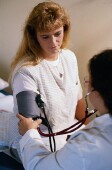
WEDNESDAY, May 6, 2015 (HealthDay News) — Stroke is the third leading cause of death in women, but many are unaware of warning signs and symptoms that are unique to females, a new study says.
Of 1,000 women surveyed, only one in 10 was aware that hiccups that occur with unusual chest pain is an early warning sign of stroke in women, said researchers from Ohio State University Wexner Medical Center, in Columbus.
Although men and women share some risk factors for stroke — such as smoking, being sedentary and having high blood pressure — others are specific to women, the researchers explained.
But only 11 percent of women polled knew that pregnancy, lupus, migraine headaches, birth-control pills and hormone replacement therapy increase their stroke risk, the study found.
“I think we have a ways to go when it comes to educating women about stroke and their unique risk factors,” Dr. Diana Greene-Chandos, a neurologist and director of neuroscience critical care, said in a medical center news release.
“Things like pregnancy, hormone replacement therapy and even something as trivial as a case of the hiccups can all play an important role when it comes to strokes in women, and we need to be more aware of it,” she added.
Other stroke symptoms the researchers say are unique to women include:
- dizziness not associated with vertigo,
- headaches,
- numbness over the entire body that is more severe on one side.
“Women may have more headaches with their strokes. They actually can have hiccups with a little bit of chest pain with their stroke symptoms, sometimes sending them down the pathway of looking for either heart disease or indigestion,” said Greene-Chandos.
“Pregnancy also increases their risk of stroke, particularly in the final months and the immediate period after delivering the child,” she said.
Signs of stroke in both men and women can include sudden confusion; trouble speaking or understanding; sudden trouble seeing; sudden difficulty walking; or loss of balance and coordination.
Identifying symptoms of a stroke early on and seeking immediate medical attention is critical because clot-busting drugs are only an option within three hours of the onset of a stroke, the researchers cautioned.
“Women do not think they are going to have a stroke. They think of it as a man’s disease,” said Greene-Chandos. “You have to know when you are having a stroke, you have to recognize that it’s a stroke and you have to get to the emergency room and receive the medication.”
Nearly half of those surveyed also said they didn’t know that following a stroke, many women experience nerve damage, problems swallowing and depression, which can prevent them from getting needed rehabilitation.
Each year more than 137,000 Americans die from stroke, about 60 percent of them women, according to the American Heart Association and American Stroke Association.
More information
The National Stroke Association provides more information on stroke symptoms unique to women.
Copyright © 2026 HealthDay. All rights reserved.

